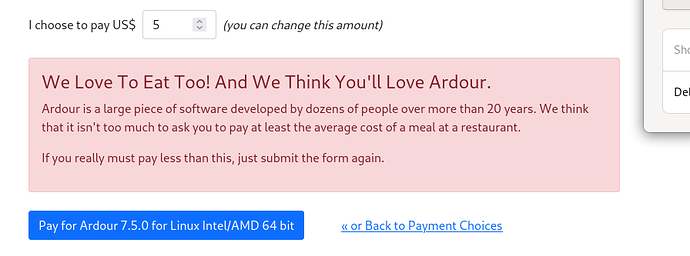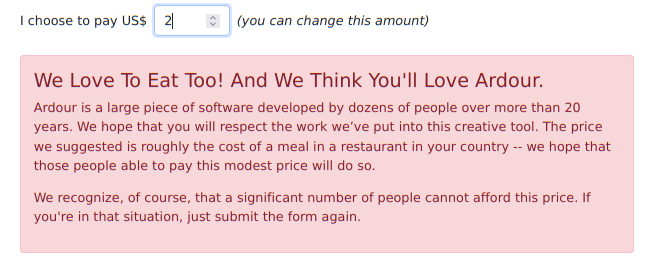Thank you for your reply, @x42.
I can assure you that there is no intention behind this to shame anyone,
I appreciate that. I never suspected you had any bad intentions. Well intended people ignoring the problems of poverty is the reason that there are still poor people in the industrialized world. It’s easy–even the default in the US–to ignore poor people, even to actively hide us. (For example, it’s quite common here for police to violently remove homeless people from public spaces and steal their belongings.) Given what I know of German politics, I suspect things aren’t too different in the culture there. So I don’t blame you for not always being conscious of these issues. I do hope that you do what you can about the issues you are aware of.
I think it is reasonable to spend as much on a DAW as one pays for guitar strings per year.
What is the marginal cost to the Ardour project of one download?
Do you think people who can’t afford a year’s supply of guitar strings don’t deserve to make music?
When poor people can’t make music, what effect do you think that has on music about solving the problems of poverty? *Note below
I appreciate your taking time to respond. I am being careful not to ask a load of questions, and I hope you’ll take seriously each of these three questions I have asked above. You won’t find any other question marks (outside of quotes) in this message.
That being said, and not being a native English speaker, could please you point out which sentence you find offending? The last one "If you really must … " ? perhaps we should change it to: “We would appreciate if you could contribute as much as an average meal in your place of residence, but also understand that it is not always possible, in which case you can just continue and submit the form again.”
“We think that it isn’t too much to ask you to pay at least the average cost of a meal at a restaurant.”
And yes, the “If you really must” line is also problematic. ““We would appreciate if you could contribute” is a good replacement for “We think it isn’t to much to ask.” And I appreciate your suggested change of “in a restaurant” to “an average meal…” but it misses the bigger point: if you put any minimum dollar amount on the product (even $1, because a lot of poor people don’t have banking accounts, making digital payments difficult), you’re excluding the poorest people and contributing to the problem. When the marginal cost of a product is negligible, there is no just reason not to donate licenses to poor people and encourage them to be voices for progress. This is especially true with a product like Ardour, the purpose of which is to empower artistic expression.
I propose the following text:
“Ardour is a large piece of software developed by dozens of people over more than 20 years. We hope that you will respect the work we’ve put into this tool of creativity, and that those people lucky enough to be able to pay the modest price of $30 will do so. We recognize, of course, that a large and growing number of people cannot afford this price. For those of you in this unfortunate position, we offer a free download of Ardour, and we hope our work will help lift your voices.”
If you’re not willing to offer a free download, we can tweak that last sentence, but for now I hold out hope that you’ll consider this.
A discussion of poverty, social security and health insurance system (or lack thereof) in the US is really outside the scope here. Personally I find it worrying if an average citizen cannot afford an averagely priced meal, and then becomes ashamed of that.
I appreciate that you find it worrying. While we’re talking about how much it’s reasonable for you to ask people living under these conditions to pay for your product, the context of the economy we live in is very much in scope. Now, it’s fair to say we shouldn’t focus on my home country. Of course if you’d like to widen the scope to global poverty, we won’t find a lack of poor people elsewhere in the world, including in former German colonies and remaining US colonies.
I think the problem is elsewhere, and not solved by some audio workstation download page changing their website.
I’m not asking you to burn down a bank, I’m asking you to make small changes that are entirely within your control as an organization if not within your control as an individual.
A lot of awful things have happened while well intended people, who could’ve collectively done something about it, stood by and watched. Regardless of the rest of this discussion, I deeply hope that anytime in life you notice yourself saying or thinking something like this, you’ll stop yourself and say, “What CAN I do?”
I appreciate your attention to this issue, Robin. I hope you won’t find anything I’ve written too harsh or offensive. I take these issues very seriously on behalf of myself and of many more people who suffer more than me and have less opportunity to do something about it.
Matt
*Note
I mentioned above “music about solving the problems of poverty,” which may require a little context. I’m inspired, for example, by this very home-made tune with lyrics that will NEVER be published by the music industry, like:
“Cuz half a million freezing on the streets is Biden’s Winter plan
And I bet you swore they told you you were voting for a different man”
Jesse Jett - The Oil Baron Rescue Plan
*Afterthought: If you frame free licenses for poor people as donations, there may be some way to take credit for it on taxes (if German taxes are anything like US taxes). For example, a non-profit I work with receives donated licenses for SalesForce software services with a nominal value of something like $20,000 per year. We as an organization pay nothing for the licenses, but the way the paperwork is worded suggests the SalesForce corporation is taking credit for the donated value in one way or another.

